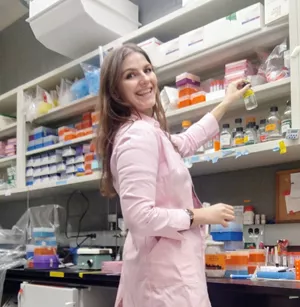
Science & Scholarship in Broad Strokes
Sasha Weiditch always had a curiosity for the natural world around her, even at one point boasting an impressive snail collection in her younger years, but it wasn’t until she started taking science classes in high school that her future path was forged.
“Prior to university I don't think I had a clear inclination of what it meant to be a ‘scientist,’” says Weiditch.
“As a high school student I was mainly thinking about a narrow range of ‘successful careers’ that I thought possible – doctor, teacher, lawyer – and in my mind to be a doctor you had to take science. Luckily for me, I learned to enjoy my science courses the most! I loved Biology and Chemistry for the ability to learn the science that could explain what is happening in our bodies and in our environment. Then it wasn’t until university that I learned the plethora of careers available for someone with an interest in science, and it was then that I decided to pursue a PhD.”
Weiditch, who is in the 5th year of her PhD in Cell & Systems Biology studies under the supervision of Professor Voula Kanelis, a faculty member in the Department of Chemical & Physical Sciences, focuses on structural biology using NMR spectroscopy. Weiditch investigates proteins involved in the synthesis of the bacteriophage, a virus that infects and kills bacteria. A better understanding of bacteriophages could ultimately lead to novel therapies for antibiotic-resistant bacteria, which is a growing concern in the healthcare field.
Aside from her own busy academic pursuits that keep Weiditch working in the laboratory here on the UTM campus most days of the week, she is a stalwart supporter of science promotion, particularly for budding female scientists and academics.
“I have been inspired by the amazing lineup of intelligent women I’ve worked with over the course of my academic career,” says Weiditch, who has spent the bulk of that time on the Mississauga campus having completed her Bachelor of Science before entering into a Master’s degree and then transferring to a PhD program at UTM. She is part of an emerging group of young female scientists who are encouraging the next generation to think about careers in academia. Weiditch sites other colleagues, such as Samantha Yammine, a PhD candidate at UofT on the St. George campus, and Lisa Jones, a PhD candidate based in the UK, as counterparts in this endeavour. They have identified a niche for science promotion, and have discovered that young women are interested in hearing about and from other women who have already tread down this science and scholarship path.
“I have found, personally, taking part in outreach activities is a great way to connect with undergrad and high school students, who may be interested in pursuing graduate school or a scientific future, and it is also a new way to engage students and other faculty members,” says Weiditch.
Weiditch has participated in and has organized a range of science-promotion initiatives. She profiles women in science, with a targeted focus on other graduate students, through her social media channels, and finds fun ways to engage followers, such as a request to tweet about a favourite female scientist, which led to an interesting virtual dialogue. She also lent her voice and science expertise to a Soapbox Science event held in Toronto’s Yonge-Dundas Square in May 2017 along with 12 other women; Soapbox Science is another social/communications platform for women to – literally – stand on soapboxes in busy public spaces and communicate their research. In addition, for the past two years (2016-2017) she has initiated and coordinated a “Women in Academia” luncheon, which is targeted to female grad students to have a safe space to seek support, share ideas and communicate experiences with a panel made up of 7-8 female academics. She has several ideas for other ways to promote female academics including live-stream series featuring a Q&A with faculty members, and also allowing a student social-media takeover.
“In my promotion of women in science and academia, I aim to profile a range of aspects, such as the person’s individual experience into science, the focus of their research, and outside interests. My goal is to provide real-life examples of women pursuing scientific paths, fighting the stereotype of ‘scientist’ and doing phenomenal things, such that girls and women, too, are inspired to achieve their goals,” says Weiditch.
“I see this as an opportunity and a platform to talk about science, to make valid contributions, and to serve as a counteraction to the negative images and messages young people, particularly young women, see on social media.”
Resources for inspiration
- To check out Weiditch’s social media efforts, see https://www.instagram.com/scigirlsash/ where she currently has ~3700 followers.
- She is also the creator of #PhDenomenalPhDemale at https://www.instagram.com/explore/tags/phdenomenalphdemale/.
- On Twitter she is at https://twitter.com/scigirlsash with nearly 1000 followers.
- Weiditch’s website [under construction at time of this article] is https://scigirlsash.wordpress.com/about/.
- See the article, “The Ph.D. grind: beyond the lab bench,” about Sasha that appeared in The Medium last year.
- Samantha Yammine, a PhD candidate at UofT on the St. George campus is at https://www.instagram.com/science.sam/?hl=en.
- Lisa Jones, a PhD candidate in the UK, runs In a Science World Blog, https://inascienceworldblog.wordpress.com/about/. Jones wrote about Weiditch for her blog in November 2017, https://inascienceworldblog.wordpress.com/2017/11/02/scigirlsash/.
- Soapbox Science and their upcoming events can be found at http://soapboxscience.org/.
